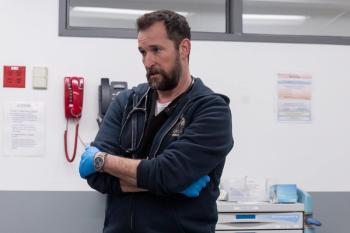
Donna Shalala talks about COVID-19, telehealth, abortion rights, and leadership
The former health and human services secretary offered lessons for healthcare leaders in a forum with Kevin Sowers, president of the Johns Hopkins Health System.
Donna Shalala has spent many years playing a pivotal role in the nation's healthcare policy.
Shalala became the U.S. secretary of health and human services under former President Bill Clinton, and her eight-year tenure is the longest in history. She also led the University of Miami for over a decade and served a term in the U.S. House of Representatives.
Shalala participated in an online forum Wednesday with Kevin Sowers, the president of the Johns Hopkins Health System and executive vice president of Johns Hopkins Medicine. In a wide-ranging discussion, Shalala talked about lessons of the COVID-19 pandemic, the future of telehealth, and the Supreme Court ruling that struck down abortion rights.
Following are some of the highlights of the conversation.
- Related story:
HHS leader announces steps after abortion ruling, warns providers to protect patient privacy
COVID-19 and public trust
The
Early in the pandemic, she said health officials could have done a better job of explaining that the knowledge of COVID is fluid. She said officials should have clearly, said, “This is what we know about COVID but it’s going to change.”
“I think we’ve learned a lot of lessons about this, about communication,” Shalala said.
She said there have always been anti-science voices, but in the past, health officials worked with elected officials in both parties to overcome those figures. She said it’s going to have to happen again. Even in a bitterly divided government, Shalala noted there continues to be strong, bipartisan support for the National Institutes of Health.
Shalala called for an integration of the medical system with the public health system. Otherwise, responsibilities shift with resources, she said.
The NIH budget doubled during the Clinton administration, with the backing of Republican and Democratic lawmakers. She said that paid dividends in during the COVID-19 pandemic.
Shalala maintains a friendship with Anthony Fauci, who she worked with in the Clinton administration during the earlier years of the AIDS crisis. In fact, she has a dog named “Fauci.”
Telehealth’s ‘golden age’
The use of
“We’re in the golden age of telehealth,” she said. “We have to use it very carefully.”
She said she was impressed by how much specialists are embracing telehealth. She also said telehealth offers a remedy for reaching patients who skip in-person appointments.
The questions of reimbursement for providers still need clarity, she said, “but we can solve that problem.”
But she also noted that some seniors aren’t comfortable using telehealth, particularly video services. “We still have to continue to use the telephone until we change generations,” Shalala said.
- Related story:
Using telehealth to improve equity and access
Roe v. Wade and the fallout
Shalala condemned the Supreme Court’s ruling that abortion isn’t a constitutional right. Roughly half the states have passed or are expected to enact measures prohibiting abortion.
- Related story:
Hospitals wrestle with Supreme Court ruling on abortion - Related story:
After Supreme Court ruling, medical schools weigh impact on training
Echoing the concerns of many health groups, she said the ruling will add to healthcare disparities among members of disadvantaged communities. Many can’t afford to travel to states where abortion is legal.
She said there must be a focus on providing greater access to contraceptives. “In low-income communities, many people can’t afford contraceptives,” she said.
“We just have to focus on low-income communities and protect low-income women” she said.
Telemedicine offers the option of helping some people get medication abortions, she noted.
Shalala, who is 81, recalled vivid memories of life in America before the Roe v. Wade ruling nearly 50 years ago. “It was devastating on college campuses,” she said.
“I know people that died from illegal harmful abortions because they didn’t have access to a safe place,” Shalala said.
Depending on the outcome of the congressional elections, Shalala said Congress can act to change the law. “SCOTUS is not the last word, if Congress can pass a law,” she said.
Nursing
The COVID-19 pandemic also provided reminders of the vital roles nurses play.
Many healthcare systems have seen a shortage of nurses during the pandemic. Some nurses have also said the healthcare system
“I think of nursing as central to the healthcare system,” Shalala said.
“They are not handmaidens to medicine,” she said. “They are part of the team and a critical part of the team and need to be treated like peers.”
She also said advanced practice nurses can play a greater role in healthcare. “They can make a difference. We’ve got to expand their scope of practice,” Shalala said. Some states have already taken that step, she noted.
Shalala said the role of nursing has changed significantly, but added, “We have a long way to go.”
Leadership lessons
Shalala shared her leadership experiences running the health and human services department. Some of the department’s leaders had “strong egos.”
“They knew their jobs, but they needed to be managed as a team,” she said. She said she learned to help the team come together “in the policy-making process and the budget-making process.”
“My skillset is my ability to understand multiple cultures and how to weave people together,” she said.
In a time of turmoil, such as the early years of AIDS, she stressed the importance of having a team focusing on that challenge. “You have to look at the big crisis and make sure you have a team that’s managing that,” she said.
Shalala also stressed the importance of casting a wide net for ideas. She said she sent a note to staff asking for any and all ideas, and some researchers pointed to a study that found putting babies on their back could reduce Sudden Infant Death Syndrome.
The department launched a “back to sleep” campaign that included hospitals, diapers, and even the AARP to reach grandparents that were caring for babies. The campaign helped lead to a sharp reduction of deaths due to SIDS.
“The back to sleep campaign was hugely successful,” she said.
Leaders need to juggle, she said, which involves maintaining focus but also being open to new ideas.





























































































